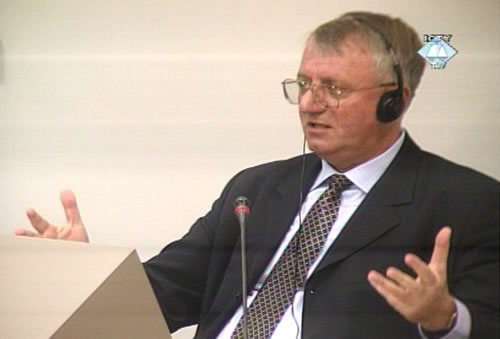Home
DOES THE TRIBUNAL HAVE JURISDICTION OVER VOJVODINA?
In his motion, Vojislav Seselj challenges virtually everything: from the legality of the founding of the Tribunal to its jurisdiction in general, and particularly, its jurisdiction over alleged violations of international humanitarian law committed in the territory of Vojvodina.
 Vojislav Seselj in the courtroom
Vojislav Seselj in the courtroom Vojislav Seselj, just like Slobodan Milosevic, does not recognize the Tribunal in The Hague and refuses to appoint his defense counsel, quoting the Statute which guarantees his right to defend himself. Unlike Milosevic, who refuses to submit any written motions to the "illegal tribunal", Seselj simply loves filling sheaves of paper with his motions and his correspondence with the Registry, the Trial Chamber and the Appeals Chamber of the Tribunal he does not recognize. In the past year, he has submitted some thirty hand-written motions on a variety of topics: complaints about his "mental anguish" caused by the red and black robes of the judges, to his demands that the Tribunal intervened on behalf of his personal confessor Bishop Filaret – on the list of personae non gratae in the EU - so that he can get a Dutch visa and visit him in the Detention Unit and hear his confession there.
The latest in the series is Seselj's motion about the indictment. On forty densely typed pages, he challenges virtually everything: from the legality of the founding of the Tribunal to its jurisdiction in general and its jurisdiction in the territory of Vojvodina in particular. In the indictment, Seselj is charged with crimes against humanity and violations of laws and customs of war in Croatia, Bosnia and Herzegovina and a part of Vojvodina, from August 1991 to September 1993.
The Vojvodina portion of the indictment against Seselj deals with the events in the village of Hrtkovci, where the accused, as the indictment alleges, held an "inflammatory speech" on 6 May 1992 in which he called for the expulsion of Croats and then read out a list of names of the Croatian villagers who were to leave the village. The prosecutor alleges that on that occasion Seselj in effect issued instructions to his local followers to use pressure and death threats to force those who were unwilling to leave their homes to actually do it. Immediately after Seselj's visit and speech, the indictment alleges, there began a campaign of ethnic cleansing, abuse, assaults and threats to the local Croats that they would be killed unless they left. As a result, all the Croats left the village in the next three months and their homes were looted and taken.
Seselj, however, thinks that the Tribunal does not have jurisdiction over any crimes in Hrtkovci, because, as he states in his motion, "in Vojvodina from 1 January 1991 until today there were no sides to the conflict and therefore an armed conflict of sufficient scale and intensity was not possible…", nor was there a "systematic and widespread" attack on civilians. These are the prerequisites for the Tribunal to have jurisdiction over such crimes. If there were any crimes in Hrtkovci at all, Seselj goes on to say, they would be in the jurisdiction of the domestic courts, not of international ones.
The prosecution has filed responses to Seselj's motion. The first points out that the existence of an armed conflict in Croatia in the times relevant for the indictment has already been proven before the Tribunal and that the crimes Seselj is charged with are in an "objective geographical and temporal relationship with this armed conflict". The prosecution claims that this meets the requirement for the jurisdiction of the Tribunal. International law, it is stated in the response, is applicable in the entire territory caught up in an international or internal conflict "regardless of whether there is combat or not:. The prosecution further claims that "it is enough for the alleged crimes to be closely connected with the hostilities in other parts of the territory controlled by the sides to the conflict”.
In their additional response, the prosecution quotes the statements made by the accused. They had been provided by Seselj when he notified the OTP of his intent to offer "special defense". In an interview to the weekly Duga in December 1992, Seselj, as quoted by the prosecution, explains that the events such as the one in Hrtkovci are "inevitable in a war situation". According to the prosecution, an interview given by the accused to Radio B92 in September 1993 is particularly interesting. In it Seselj speaks about international law with regard to the treatment of the Croats in Vojvodina. “In war conditions” – Seselj said in 1993 – “if you are in war with another country, the members of the ethnic minority of that state residing within your borders are potential spies, and measures of caution are taken against them, certain measures are taken against them that are also recognized by the international law of war.”
This is why, the prosecution concludes, “the Accused cannot claim today that this Tribunal, which enforces international humanitarian law, has no jurisdiction over crimes committed within the Republic of Serbia that were temporally and geographically linked to an ongoing armed conflict in other parts of the former Yugoslavia.”
